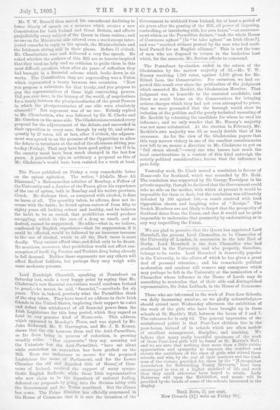Mr. T. W. Russell then moved his amendment declining to
fetter liberty of speech on a measure which creates a new Constitution for both Ireland and Great Britain, and affects prejudicially every subject of the Queen in these realms ; and no one on the Ministerial side uttered even a word except inter- jected remarks in reply to his speech, the Ministerialists and the Irishmen sitting still in their places. Before 11 o'clock, Mr. Chamberlain rose and delivered a very fine speech. He asked whether the authors of this Bill are so heaven-inspired that they need no help and no criticism to guide them in this most difficult question, when after six years of reflection they had brought in a. financial scheme which broke down in six weeks. The Constitution they are superseding was a Union which represented a treaty between two countries. 'Now you propose a substitute for that treaty, and you propose to gag the representatives of those high contracting powers. Did you ever hear, in the history of the world, o negotiations for a treaty between the plenipotentiaries of the great Powers in which the plenipotentiaries of one side were absolutely silenced?" But argument was of no use. Nobody replied to Mr. Chamberlain, who was followed by Sir E. Clarke and Mr. Goschen on the same side. The Gladstonians resisted every proposal for the adjournment of the debate, and succeeded in their opposition in every case, though by only 29, and subse- quently by 27 votes, till at last, after 3 o'clock, the adjourn- ment was agreed to on the promise of the Opposition to allow the debate to terminate at the end of the afternoon sitting yes- terday (Friday). That may have been good policy ; but if it is, the country must have been much changed in the last few years. A generation ago, so arbitrary a proposal as this of Mr. Gladstone's would have been resisted for a week at least.










































 Previous page
Previous page